
Everyone knows what it takes to become a doctor, a lawyer, or an engineer. Even if they don’t know the exact sequence of courses and exams it takes to become qualified for their careers, they at least know that such a path exists—specialized schools, an established set of core competencies, and globally-recognized degrees that people use to indicate their qualifications by appending letters like M.D. or J.D. at the end of their names.
No such letters exist for a qualified product manager. There’s no specialized school, no set course of study. You might be able to map a product-management course of study through a business school, but an MBA is too generic to indicate specialization in product management. Put simply, the role is too new on the scene to have a well-trodden educational pathway.
Yet it is rapidly becoming a product manager’s world. As Cloud computing and IoT development align themselves at the center of the business universes, qualified product managers are becoming the new rock stars of entrepreneurship. How to become a qualified and employable product manager is a hot topic in business education, a question that some of the most prestigious B-schools are trying to answer.
What Is Product Management?
What exactly is the role of product manager? What are the responsibilities it encompasses? Is it similar to the role of a “project manager,” or the “product owner” on an agile team? It’s certainly easy to get these roles mixed up.
The role of product manager is actually a lot bigger than the role of a project manager or the product owner. Where a product manager sits in the organizational chart varies from company to company. They’re not developers or marketing specialists, though their functions cross into both sandboxes. They usually stand apart, and because of the importance of the role, they often answer directly to the CEO, board of directors, or other arms of upper management.
Here’s how best to understand the role of the product manager. In a meeting of key stakeholders, developers will advocate for the coding and UX needs of the product; the marketing team will argue on behalf of creating brand awareness; directors and managers may advocate on behalf of streamlining business processes and investor or shareholder concerns.
The product manager’s job is to advocate on behalf of the product itself. Whatever it takes to make the product succeed, the buck stops with the product manager to marshal resources, build teams, and design strategies to make the product as successful as it can be.
This often involves exhorting cross-functional agile software development teams, including team members like the more strategic product owner, to pull in the same direction, adhering to a budget and a production schedule.
The product manager may not be a professional marketer, coder, salesperson, or administrative manager–but it helps for the product manager to know a little bit about all of these roles in order to reconcile them for the benefit of the product and dissuade collaborating departments from guarding their turf.
Another key feature of the product manager role is the need to stay close to the customer or potential customer, mindful of the customer’s experience of the brand, and collecting feedback that can be used to make the product better. This is particularly important in an agile environment of continuous delivery.
In understanding the role of product manager, it is essential to understand what we even mean by “product” in this context. Most people think of the “product” as the widget on the shelf, or the thing they get when they click “Buy Now” on the Amazon product page.
From the standpoint of the product manager, this is only partially the case. The product, in this sense, is the user’s or customer’s entire experience of the brand, from discovery to purchase to retention.
This means that product management touches on UX design, marketing, and sales. The role of product manager is well established in startups and software innovators, but more and more established companies, as well as makers of non-digital products, are jumping on the product management bandwagon.
In short, we’re talking about a growing profession with a specialized skill set that is highly in demand. GlassDoor.com estimates product management salaries at between $70,000 and $140,000—remarkable for a career with no set degree path or established credentials.
The lack of a clear educational track means that there’s no one-size-fits-all pathway to becoming a product manager. People come to the job in a variety of different ways. But regardless of how they got there, product managers sink or swim based on their mastery of certain critical competencies.
For both aspiring and working product managers, that’s where education comes in. And with no beaten path to follow, product managers have the freedom —and the burden—of charting their own course.
Learn Product Management Online
Sold yet? Ready to hit the books? We have compiled this list of essential online courses relevant to the product management role, including offerings by prestigious institutions like Emory University, University of California, University of Illinois, University of Virginia, and Erasmus University Rotterdam, many of them offering degree credit.
You may not get letters to put at the end of your name, but the skills imparted by these online courses represent a huge leg up when competing for product management jobs. If you are already a working product manager, they can represent an opportunity for continuing education and excellence in your craft, opening the doors to bigger and bigger opportunities.
Here it is—our list of the absolute best product management courses you can take online.
1. Digital Product Management: Modern Fundamentals

University of Virginia via Coursera
What it includes: This course by the University of Virginia addresses the changing role of product manager in a landscape of digital products—the switch from a largely nuts-and-bolts role with little customer contact, to the very heart of the process cycle, responsible for deep insights into customer behavior. It’s an ideal course for someone to learn the basics of what it takes to be a product manager today.
The course is broken down into four weeks:
- Creating an actionable focus for each product to be managed.
- Modern product management methods.
- Exploration of new product ideas and management of new products.
- Management and amplification of existing products.
Instructor Alex Cowan has taken great pains to make this course relevant to the modern product management landscape, where digital products may need to be updated several times a day, and where a commitment to outdated paradigms of product management may threaten the product rollout and even the very viability of the company. It’s important stuff, and helps you develop the critical competencies you need to be employable as a product manager.
Key skills you’ll gain:
- Product/Market Fit
- Product Management
- Design Thinking
- Innovation Pipeline
- Lean Startup
Hours to Complete: 11
Cost: $79 USD per month
Promising review:
“I felt like I went from only a vague understanding of what it means to be a product manager to a much more focussed view of what this role entails, common best practices, experiences from other product managers, etc. This course was great for helping me decide if I wanted to pursue Product Management as the next stage in my career seriously or not … I am glad to say that I am hooked and when I become a successful product manager this course would have been instrumental in retrospect.”
2. Intro to Software Product Management

University of Alberta via Coursera
What it includes: In a market dominated by Cloud services, “product management” and “software product management” are becoming more and more redundant. The most exciting products to be managed will be digital, and understanding the unique characteristics of software product management will expand an aspiring product manager’s job prospects exponentially.
Associate Professor Kenny Wong provides crucial insights into:
- The discipline of software product management, and the path of a product from inception to release.
- Foundations of software product management, including the crucial “triangle” of 1) client needs, 2) on-time delivery, and 3) staying on budget.
Wong pays critical attention to the role of a software product manager in an agile environment, which will open many doors for aspiring product managers who are unfamiliar with the often-ritualistic, sometimes-strange subculture of agile software development. In a tight five-hour package, this course delivers crucial lessons on the role of the product manager in building better software.
Key skills you’ll gain:
- Agile Software Development
- Software Product Management
- Software Project Management
Hours to Complete: 5
Cost: $49 USD per month
Promising review:
“Excellent Introduction to basics of Software Development Process .. I am [a] 10-years experienced software professional, and can truly certify the elements mentioned in the course. Also having said, it is a good refresher as some of the topics are not strictly followed by industry leading to issues after a couple of months … Would recommend for everyone!”
3. Design-Led Strategy

University of Sydney
What it includes: Design-led product strategy plays a bigger and bigger role in the product management landscape compared to technology-led strategy—many companies are competing for market share with products using the same technologies. Sound product management is critical to design-led strategy, since the strategy involves determining what the customers need or lack relative to competitive products, then building a product around the quest to meet those leads or bridge those deficits.
Professor of Strategic Management Eric Knight immerses students in the concept of design thinking, including important distinctions between design strategy and traditional business strategy. He covers practical strategies to unstick innovative product ideas and save them from an untimely death bogged down in boardrooms.
Most importantly, Prof. Knight walks students through multiple real-world examples of design-led thinking in action and the impact it had on the development of real products. This practical focus includes an exhaustive conversation with the CEO of cutting-edge Australian financial institution UBank, as well as a deep dive into design-led thinking behind the scenes of multinational reinsurance giant Swiss Re.
Key skills you’ll gain:
- Principles of design-led strategy
- Primary market research
- Problem statement
- Prototyping and product ideation
Hours to Complete: 20
Cost: $49 USD
Promising review:
“Intense, highly insightful, very practical and helpful, constant real-business-world examples and case discussions, very high value through conveying ease with understanding and applying the intersection of Design Thinking and Business/Corporate Strategy. Highly recommended!”
4. New Product Development
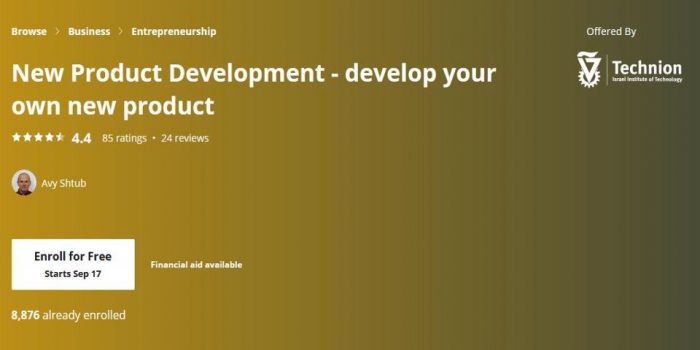
Israel Institute of Technology via Coursera
What it includes: Expertise in new-product development is in high demand for two reasons: 1) nothing correlates with the successful sale of a company like the success of a brand-new product; and 2) rates of product failure remain high. That means aspiring players are thirsty for product managers whose skill set includes creating new products from scratch, not just building on and enhancing the success of an existing product.
Professor Avy Shtub prepares students to take on this critical role by laying out tested processes and methodologies for New Product Design (NPD) cycles. Through 21 hours of intensive instruction, Shrub covers critical terminology and key insights product managers will need to shepherd the product development process from selection to planning to development to release. Students emerge from this class with a working knowledge of how to develop a working plan for NPD, as well as execute the plan in even the most uncertain environments.
Key skills you’ll gain:
- New Product Development
- Product Configuration
- Voice of the Customer
Hours to Complete: 21
Cost: $49 USD
Promising review:
“Excellent course ! Among its benefits is the ability to use the Project Management Simulator, [which] allows you to practice, in a safe environment, optimization of the project management at each and every step. You can then port the data, among others to Microsoft Project manager. The instructor of the course, Prof. Avy Shtub, won the PMI teaching award for 2018.”
5. Fundamentals of Project Planning and Management

University of Virginia via Coursera
What it includes: “Projects” come in all shapes and sizes. Most organizations have multiple projects running at all times, some of them related to or part of the purview of the product manager; others not so much. Regardless, every product manager needs to understand the best and most current practices for the planning and execution of projects.
Product development is a big project, with many sub-projects to attend to along the way. While “product management” and “project management” suffer from easily-confused titles, product managers need to be able to wear the project management hat among the many other hats a product manager must wear.
Associate Professor Yael Grushka-Cockayne analyzes each stage of the project lifecycle, identifying key features and pitfalls of each one and identifying stakeholder roles using a helpful power/interest grid. The University of Virginia Darden School of Business is a Project Management Institute (PMI®) Registered Education Provider, approved to issue twelve professional development units (PDU).
Key skills you’ll gain:
- Risk Analysis
- Project Planning
- Planning
- Management
- Project Management
Hours to Complete: 8
Cost: $49 USD
Promising review:
“This course has exceeded my expectations. Prof Grushka-Cockayne does a phenomenal job in explaining the fundamentals of Project Planning and Management in a manner that makes it easy to follow and understand. With numerous examples along the way, she succeeds in reaching out to various levels of knowledge prior to taking this course. The usage of popular software tools within this framework is very helpful and helps to illustrate the technicalities that come along with planning and managing a project. Furthermore, this course gave me the confidence in actively participating in bigger future projects, working together with people with a more in-depth knowledge of project planning.”
6. Customer Insights: New Product Development Orientation
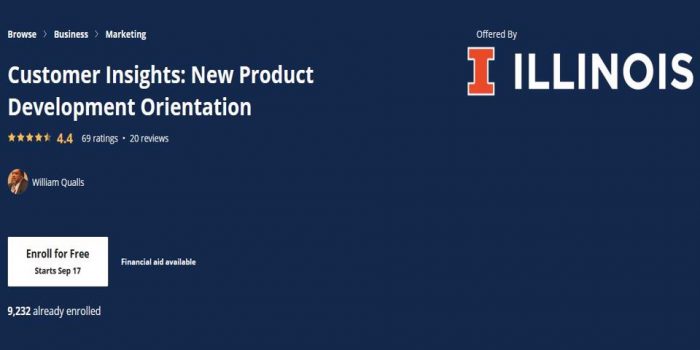
University of Illinois via Coursera
What it includes: A major job of the product manager is to stay close to the customer and gather deep insights that can inform the direction of product designs and improvements. This 23-hour course takes a deep dive into concepts, theories, and real-world applications of customer insight gathering for the purpose of new product development. It’s an essential skill set that entrepreneurs look for in their product managers.
The course is taught by William Qualls, Professor Emeritus of Marketing at Gies College of Business. Qualls offers numerous case studies to show examples of CIPD in action, affording students a front-row seat to the kinds of processes that usually take place in boardrooms and behind closed doors—the processes that produce hit products from nothing.
Along the way, students learn key lessons on what makes a great product, insights into the voice of the customer, and an introduction to customer journey mapping—all key skill sets for a product manager.
Key skills you’ll gain:
- Customer Insights and New Product Development (CIPD)
- Voice of the Customer
- Customer Journey Mapping
Hours to Complete: 23
Cost: $49 USD
Promising review:
“A very refreshing melange of quirky nuances of the market, very neatly portraying the insight that is required for product development. Very enlightening!”
7. Agile Planning for Software Products

University of Alberta via Coursera
What it includes: Digital product managers have to reckon with agile, if for no other reason than to make sure they understand the difference between their own role and the role of “product owner.” Agile development has gained more and more ground and credibility in a market that demands quick launches and constant feature updates. To skip agile is to turn your back on a huge terrain of the product management landscape.
Associate Professor Kenny Wong is your guide through the strange and ritualistic world of agile software development—a world of scrums, KANBAN boards, sprints, and epics, where it sometimes feels like up is down, down is up, and there’s no way two coders can be collaborating while never having talked to each other.
Along the way, students will learn effective techniques for the planning of agile software product development in an environment where features and minimum viable products (MVP) seem like they are rushed to market before they are even ready. Agile development requires customer feedback to perfect a product already on the market, and customer feedback falls squarely in the product manager’s sandbox. That’s why the product manager is a critical part of many agile teams–… even if some people confuse them with the “product owner.”
Key skills you’ll gain:
- Software Development
- Agile Management
- Program Evaluation And Review Technique (PERT)
- Agile Software Development
Hours to Complete: 12
Cost: $49 USD per month
Promising review:
“The course was excellent. Every concept was explained in a systematic and structured way which made it easy to grasp and recall. Other than the core tutorials, the course also had a repository of excellent resources for more in-depth study of the topics which proved very useful. There were interesting quizzes interspersed with the lectures which made it extremely interesting and thought provoking. The entire experience was so good that it makes you want to do more and more courses on the platform one after another.”
8. Software Development Processes and Methodologies

University of Minnesota via Coursera
What it includes: Software development has come a long way. Since many job opportunities for product managers will be in software development, aspiring product managers need to understand what they are getting themselves into if they hope to hit the ground running at their new assignment.
One of the key challenges of product management is that, while they are usually not coders or developers, product managers need to understand software development (and preferably a little coding) to offer the kind of cross-functional leadership expected of them.
Instructors Praveen Mittal and Kevin Wendt expose students to a conceptual approach to software engineering, helping them understand how to identify which methodology might be best suited to the task. Attention is naturally paid to buzzy methodologies, like agile, but also to the role of more traditional methodologies like Waterfall, RUP, the Incremental Model, and the Spiral Model.
Key skills you’ll gain:
- Agile Methodology
- Waterfall Methodology
- RUP Model
- Incremental Model
- Spiral Model
Hours to Complete: 22
Cost: $49 USD per month
Promising review:
“Great beginner course for those interested in software development processes and methodologies. Very applicable especially if you’re a software engineer or an aspiring IT project manager.”
9. Designing the Organization
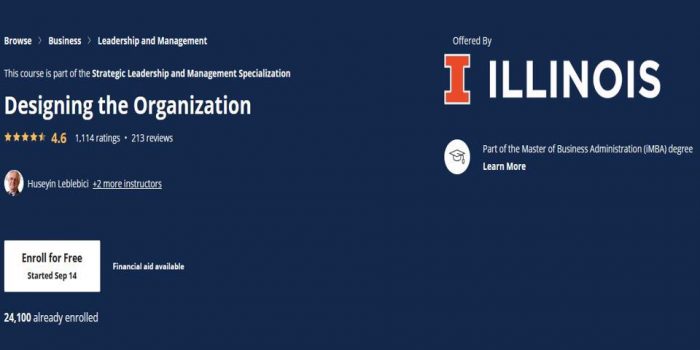
University of Illinois
What it includes: Organizational design isn’t just a critical competency for product managers, but for managers of anything, in organizations of all sizes. The opportunities for complexity and overlap are many, and a bottleneck or crossed wire anywhere in the organizational architecture can cause the whole thing to spin out, undermining the entire operation.
This course delves into the intricacies of organizational development with guidance from Professor Huseyin Leblebici, as well as Associate Professors Michael Bednar and E. Geoffrey Love. They cover the processes of identifying the organizational purpose, governance systems, effectiveness metrics, and strategies for coping with growing pains and external challenges.
Product managers need to pay especially careful attention to organizational design, since they will often act as leaders of cross-functional teams who don’t interact with each other under other circumstances—development, sales, operations, etc. A product manager skilled in organizational design will be very hireable, as well as painful for an organization to let go.
Key skills you’ll gain:
- Organizational Structure
- Knowledge of General Business Functions
- Organization Design
- Organizational Theory
- Strategic Management
Hours to Complete: 13
Cost: $49 USD per month
Promising review:
“This is an exceptional introduction to designing an organization. I greatly enjoy this iMBA specialization in Leadership and look forward to finishing all 7 courses. In one month, you learn a lot of very useful information through readings. excellent lectures, quizzes, case studies and written papers. I highly recommend this course.”
10. Design Principles: An Introduction

UC San Diego via Coursera
What it includes: While product managers are not designers or developers, it is extremely helpful for a product manager to have a working knowledge of UX design. Product managers are the advocate for the product in stakeholder meetings, and “product” encompasses the user’s entire interaction with the brand and its output. In other words, the user experience (UX) of a digital product is part of the product.
It behooves a product manager to understand what makes a particular design intuitive and what does not; why one design might work while another falls flat. Professor Scott Klemmer illuminates the critical elements of UX and UXD, including interactive design. He walks the class through a treasure trove of examples and breaks down the interfaces of multiple examples.
You will discover that on a well-designed website, almost nothing you encounter is there by accident. This course covers multiple web technologies to hone in on a paradigm of “human-centered” design that pieces together experiences with the user in mind, not the developer. If that doesn’t resonate with the mission of the product manager, we don’t know what does.
Key skills you’ll gain:
- A/B Testing
- User Experience (UX)
- User Experience Design (UXD)
- User Interface
Hours to Complete: 13
Cost: $39 USD per month
Promising review:
“Fantastic course! Learned a lot from it—both theoretically and practically. The hands on exercises were very smart and applicable. I’m left with a lot more interest in the subject, a bunch of books for further reading and some new tools under my belt. Thanks!”
11. Managing Project Risks and Changes
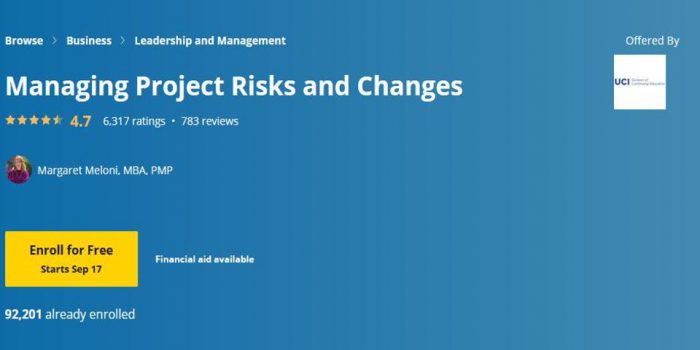
UC Irvine via Coursera
What it includes: This quick but critical six-hour course offers aspiring product managers an invaluable set of tools to approach risk management in new product development, as well as guidance on how to pivot to changes and new information. Considering digital product managers may have to implement multiple product changes daily to keep up with incoming customer and developer feedback, the importance of being adaptable and managing risk cannot be overstated.
Instructor Margaret Meloni walks students through the principles of change management with minimal disruption, putting particular emphasis on the importance of effective communication channels within the organization. Meloni lays out the components of a communication plan that will prevent stakeholders from being caught flat-footed or left out of the loop in the event of a product turning point.
She also lays out the crucial competencies needed to identify risk, prioritize risk attentiveness, and build effective risk-response plans.
Key skills you’ll gain:
- Project Management
- Change Control
- Risk Management
- Change Management
Hours to Complete: 6
Cost: $49 USD per month
Promising review:
“This is a very important and interesting course. After completing this course I have learned how to manage the risks and changes in a project … The instructor of this course taught very well and we can apply the learning in our professional sector and can gain success in managing project risks and changes.”
12. Innovation Management
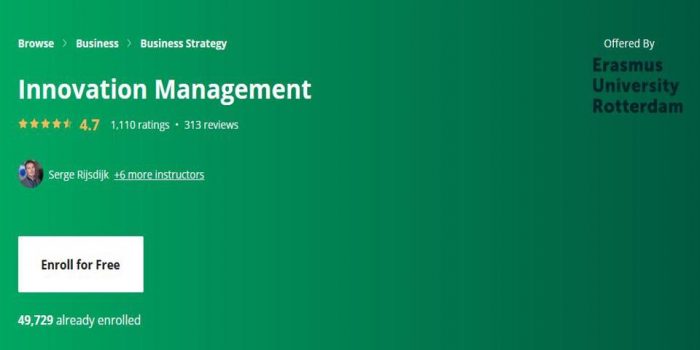
Erasmus University Rotterdam via Coursera
What it includes: Is innovation something that can even be managed? Rotterdam School of Management throws a whole chorus of instructors at the problem on a nine-week odyssey into the heart of one of the most important skills a product manager can develop—shepherding innovation from an unruly and unpredictable creative process into an actionable business plan.
This course explores the very nature of creativity and how to stimulate it, as well as core terms and concepts in innovation management. They map out the adoption life cycle and identify the three main idea management systems. They discuss building an innovation strategy for the effective management of ideas, selection of products, and structuring of organizations around product innovation.
The program also includes many practical exercises, as well as interviews with creativity consultants to gain key insights into the boardrooms of product innovators. Learn how to cope with the “fuzzy front end” in this essential course for active and aspiring product managers.
Key skills you’ll gain:
- Social Network
- Management
- Innovation
- Innovation Management
Hours to Complete: 13
Cost: $49 USD
Promising review:
“This is one of my most rewarding courses. I must add that it can not be any more timely than now. Many people are becoming innovation think tanks in ways they could have never imagined. It was a tad bit challenging yet, the skills I have acquired are priceless.. I actually learned definitions for innovation, innovation management, strategies and disruptions. Great course!”
13. Managing Talent

University of Michigan via Coursera
What it includes: If you want to sharpen a skill that addresses one of the top three headaches of CEOs across all verticals, look no further. The best ideas and innovations are useless if you can’t martial the talent to put it into place. But talent is notoriously hard to manage; it can be ego-driven and resistant to “development.”
Product managers who can manage and develop talent effectively are worth their weight in gold and practically unfireable. They can build the teams that make product development successful. It’s hard to think of a more scalable and repeatable success machine than the ability to martial human talent in a digital age.
The course has the distinction of being taught by Scott DeRue, PhD and Edward J. Frey, Dean of the Ross School of Business, alongside Associate Professor Maxim Sytch, PhD, and Chief Innovation Officer Cheri Alexander. Their lean course digs deep into the concepts of sustainable talent management.
This includes the building of a “talent pipeline” to complement any sales or innovation pipelines; also principles of coaching, evaluation and feedback; and other elements of leadership essential to the sensitive, cross-functional role of product manager.
Key skills you’ll gain:
- Onboarding
- Talent Management
- Coaching
- Recruitment
Hours to Complete: 11
Cost: $49 USD per month
Promising review:
“A very good course for those who want a thorough understanding of how HR works in an organization. This course presents the role and responsibilities of HR functions from a strategic point and gives real time examples. The sound and video quality is very good. Recommended to all those who want to shape a career in strategic HR and who want to understand how HR functions work in an organization as a whole.”
14. Managing an Agile Team

University of Virginia via Coursera
What it includes: Again, any aspiring digital product manager needs to understand agile, because nearly every software development team practices agile methodologies–or at least they think they do. The memes practically write themselves—software developers argue over who is doing agile the “right way” or the “wrong way.”
Instructor Alex Cowen cuts through most of the noise. In his clear and concise presentation, agile isn’t a religion or a masonic creed of some sort—just an approach to measuring progress and defining success. This course covers agile hallmarks like scrum, kanban, sprints, burndown, and product backlogs, but only inasmuch as they function as tools in an agile approach, not articles of faith to be adhered to at all costs. The why of agile is Cowen’s focus, not just the what.
This is a particularly useful perspective for a product manager, who cares more about the product than the process; about the user experience than the proper structure of scrums or sprints. Product managers in agile environments will probably stand somewhat outside of the agile team itself (unlike the product owner, which is an established agile role). This puts them in a unique perspective to understand agile programming for what it is, what it is useful for, and how to use agile methodologies to work for the product, not for the sake of being “agile.”
Key skills you’ll gain:
- Agile Product Management
- Agile Software Development
- backlog management
- Kanban
- XP
Hours to Complete: 11
Cost: $79 USD per month
Promising review:
“This course was a great overview and foundation of key principles and concepts in agile practices among teams. This course would benefit anyone that is managing agile projects or teams. Even if you understand agile principles, I would still recommend this course to gain a good understanding of the methodologies and practices that are popular today. I like the Coursera content that incorporates interviews with influencers in the industry.”
15. Managing G Suite

Google, via Coursera
What it includes: Google G Suite is about more than just making fun of people who still have Hotmail instead of Gmail. Google’s plan for world domination runs straight through Cloud productivity services. They have spent the last decade quietly building on the most useful and flexible webmail service in the world into a whole Cloud’s worth of useful SaaS products, essentially enabling companies to bring an entire workflow into one Cloud space. Soon we will all be children of Google.
As a product manager, with project productivity in your hands, you might as well learn how to make the most of it. An entire business could be run within G Suite if you know how to leverage tools like Google Drive, Google Calendar, and Google Vault. G Suite can be used to manage webmail aliases through Gmail, including multi-domain management.
This course, offered by Google itself, includes orientations for the various admin panels and back office spaces to keep the sometimes-sprawling world of the Google Cloud under control.
Key skills you’ll gain:
- Google G Suite
- Gmail
- Google Drive
- Google Calendar
- Google Vault
Hours to Complete: 8
Cost: $49 USD per month
Promising review:
“Great overview and well taught—I love the hands-on way in which this course takes you through the management and execution of the competencies.”
16. Strategic Innovation: Managing Innovation and Initiatives
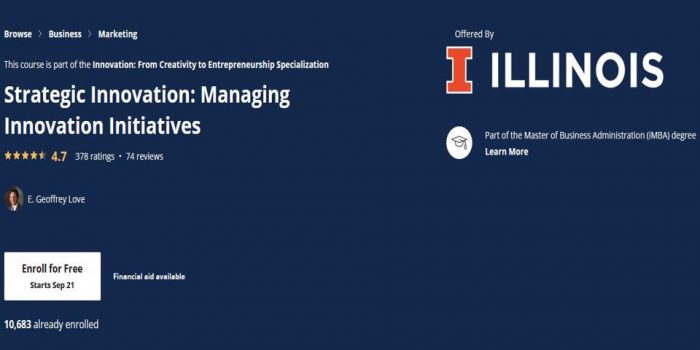
University of Illinois via Coursera
What it includes: A key challenge of innovation is baked right into the cake—when a thing is innovative, no one has ever done it before. That means that the traditional roadmaps may work–or they may not work. A key challenge of product management is developing a repeatable process that is adaptable enough to conform to any curveballs the innovation process may throw at it.
Associate Professor E. Geoffrey Love lays out a framework for coping with the uncertainty that comes with the innovation process in an orderly fashion. He addresses the processes needed for incorporating innovation processes into established businesses, which are inherently risk-averse and resistant to change. The course also addresses the peculiar challenges of innovating with disruptive technologies that render all the rule books obsolete.
Love also covers best practices for building teams around innovation processes, as well as strategies for planning innovative sprints and evaluating the results. Any product manager who wants to work on the cutting edge of world-shaking innovation needs to sharpen this skill set.
Key skills you’ll gain:
- Management
- Innovation
- Disruptive Innovation
- Innovation Management
Hours to Complete: 21
Cost: $49 USD per month
Promising review:
“One of the best management classes I’ve had the opportunity to take. If you want to be better at leading teams, at implementing innovation effectively, whether a manager or a team contributor, this class will absolutely give you a leg up.”
17. Analyzing Product Opportunities with Creately
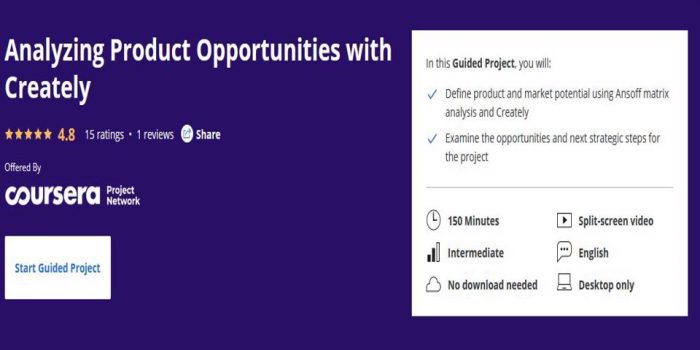
Coursera
What it includes: Coursera offers a lean and practical orientation to Creately, an SaaS platform for visualizing product designs and workflows in a collaborative environment. The course contains everything you need to become fluent in Creately, a highly marketable skill for product managers.
More so than just visualizing the product, Creately includes features that allow product managers to analyze product ideas in search of weaknesses to correct or of pitfalls that may suggest a different strategy. Creately can be used to analyze “product attractiveness,” helping organizations decide whether or not to pursue an idea further.
The all-online class, taught by Creately expert Jasper Albert, walks students through several hands-on exercises to learn the most useful software features. It also shows students how to create customized product templates, use the Ansoff Matrix, identify diversification strategies, and bring it all together into a universal product analysis strategy, customized to each organization.
Key skills you’ll gain:
- Startup
- Business Strategy
- Entrepreneurship
- Innovation
Hours to Complete: 2
Cost: $9.9 USD per month
18. Managing Uncertainty in Marketing Analytics
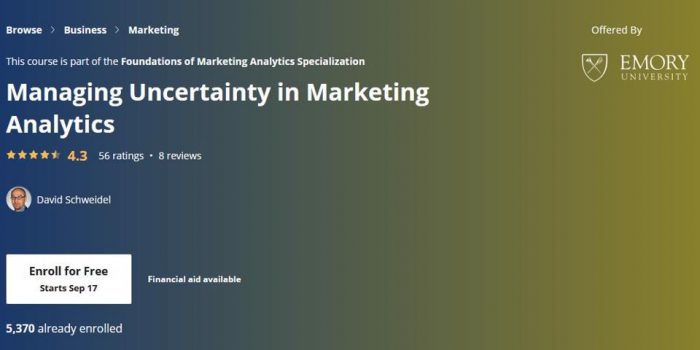
Emory University via Coursera
What it includes: In a data-driven age, it’s easy to find yourself in front of stakeholders who want guaranteed results. There’s enough data and the tools are all out there. Why can’t we synthesize that data into a sure thing?
Professional marketers know that isn’t how it works. They use the data available to them to make the best possible decisions, but even in the presence of robust and impeccable data, a vast range of outcomes are possible. The goal is not to eliminate uncertainty, but to incorporate uncertainty into the analysis model, building workable strategies for multiple outcomes.
Abandoning specialized software tools in favor of basic spreadsheets, Associate Professor David Schweidel focuses on core principles like probability distributions and Monte Carlo simulations to demonstrate paradigms of uncertainty modeling.
Product managers working with new or innovative products will find these techniques particularly useful when working in the uncharted waters of disruptive technologies and completely new products—some of the most exciting, lucrative, and rewarding product management challenges.
Key skills you’ll gain:
- Probability Distributions
- Monte Carlo Simulations
- Uncertainty Modeling
Hours to Complete: 13
Cost: $49 USD per month
Promising review:
“In one word: USEFUL. And that is a lot these days. I use the concepts (and excel tools) everyday!”
19. Budgeting and Scheduling Projects
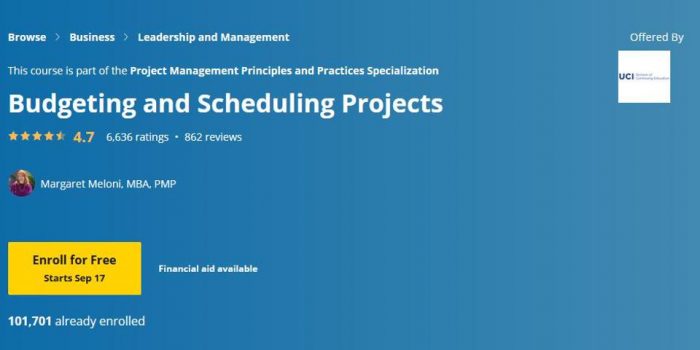
UC Irvine via Coursera
What it includes: Often lost in the heady work of innovation is the more pedestrian work of budgeting and scheduling. Product managers need to master these critical tasks to keep products on track. They often lead cross-functional teams with competing interests. Teams may care more about changing the world than about staying on budget and meeting deadlines. It is often the product manager’s role to keep this entire train on the tracks.
Instructor Margaret Meloni lays it all out in practical and actionable detail, teaching students basic principles like:
- Identifying Resource Needs
- Estimating Activity Durations
- Creating Milestone Schedules
- Calculating Float
- Use of Leads and Lags in a Product Schedule
Meloni explicates the three common methods of estimating project costs and how to know which method is the best one for your project. She also explains how to use a responsibility matrix to assign project responsibilities.
It’s not the most romantic course for a product manager–but it’s absolutely essential. Don’t skip the nuts and bolts.
Key skills you’ll gain:
- Schedule
- Project Management
- Budget
- Budget Estimation
Hours to Complete: 6
Cost: $49 USD per month
Promising review:
“Great course going into important details on cost and budgeting. I really like the video portion which gives real-world examples that help reinforce and bring the concepts to an everyday audience.”
20. Bridging the Gap Between Design Strategy and Delivery
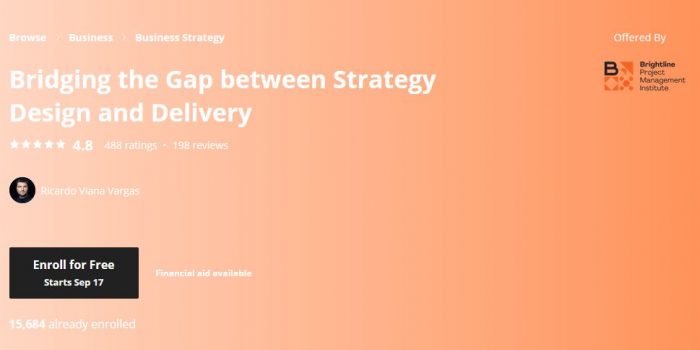
Brightline via Coursera
What it includes: A core offering of the Brightline Project Management Institute, this course addresses the fact that so many initial design strategies barely resemble the final implementation or delivery of the product. Companies that do not know how to adapt to change, instead choosing to adhere slavishly to the initial strategy, risk substantial losses.
The course lays out Brightline’s 10 Guiding Principles to bridge the gap between strategy and delivery. Brightline Executive Director Ricardo Viana Vargas walks students through numerous real-world examples of the strategy-delivery gap, in both private- and public-sector and nonprofit organizations, interviewing numerous executives to pin down the common threads that allowed them to succeed despite having to make crucial pivots.
Aspiring product managers will find the 10 Guiding Principles extremely applicable to managing cross-functional teams and steering product development through uncertain waters in the direction of delivery and release.
Key skills you’ll gain:
- Strategy Implementation
- Business Strategy
- Management
- Strategic Management
- Leadership
Hours to Complete: 19
Cost: $49 USD
Promising review:
“I strongly recommend this course! It’s a very well structured program with very interesting and useful contents for people that want to make a difference. It probably sounds obvious that strategies once developed need arduous execution to become a reality, right? Well. that’s not exactly what happens to most organizations nowadays. The 10 Guiding Principles, when effectively applied, bridge the gap between strategy definition and strategy delivery.”
21. DevOps Culture and Mindset
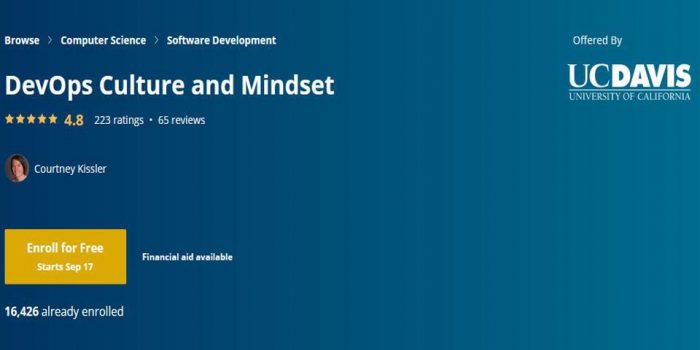
UC Davis via Coursera
What it includes: DevOps often goes hand-in-hand with agile development, unifying development and IT functions to accelerate the development life cycle. Like agile, the goal is the continuous delivery of high-quality software. Many of the principles of DevOps come directly from agile. Also, like agile, DevOps is something that an aspiring software product manager needs to understand to be universally employable.
Product managers aren’t developers or IT, but they need developers and IT pulling their oars in the same direction as cross-functional teams in service of the product. If these team members subscribe to the DevOps culture and mindset, product managers need to understand that mindset and be ready to work with it.
Nike Digital Platform Engineering VP Courtney Kissler is your guide through the fundamental principles of DevOps. Her instruction includes the organizational models common to DevOps, as well as value stream mapping and other key DevOps concepts and tools to create continuous workflow and implementation. A key tool in the toolbox of a digital product manager.
Key skills you’ll gain:
- DevOps
- Value Stream Mapping
Hours to Complete: 14
Cost: $49 USD
Promising review:
“Excellent course. Rich on real-life examples that can help in understanding the DevOps principles and best practices. Highly recommended for IT leaders and management.”
Summary
While becoming a Product Manager is not as well-defined as becoming a Doctor or Lawyer, there are a number of skills directly relevant to the role. These courses offer a valuable opportunity to those interested in the field to learn skills such as market research, talking to customers, product-market fit, building and prioritizing a roadmap, managing software teams, iterating to improve, and effectively working with data — all knowledge potential employers look for. A completed course on your resume can be the difference between being passed on and receiving an interview!
Whether you’re aspiring to land your first role or want to continue your lifelong education as a Product Manager, a course from this carefully curated list could be exactly what you’re looking for.









